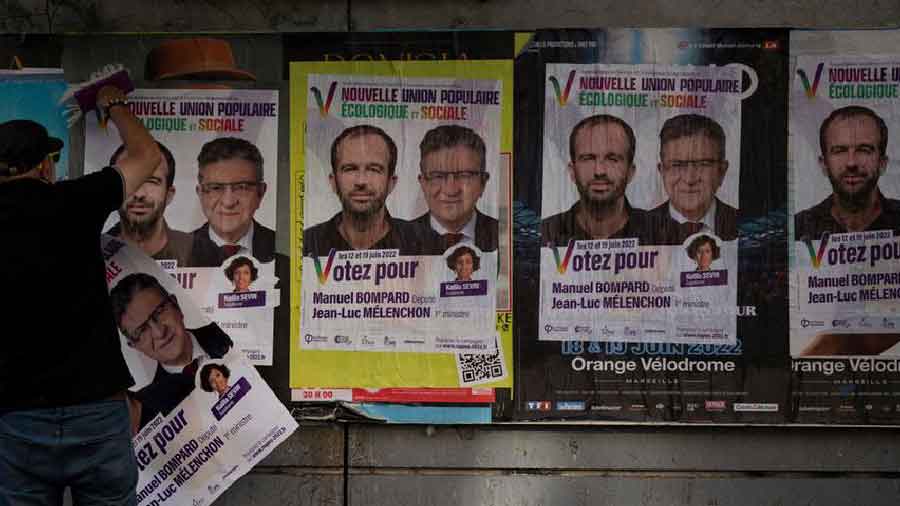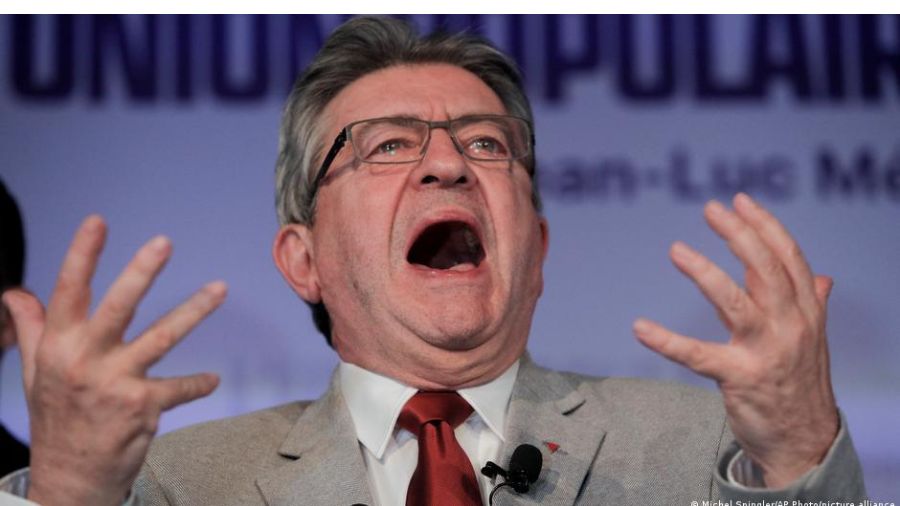Polls have opened for the first round of France's parliamentary election. Freshly re-elected President Emmanuel Macron is fighting to keep control of the legislature, threatened more by the far-left than the far-right.
Polling booths on mainland France opened at 8 a.m. local time (0600 GMT/UTC) on Sunday, with approximately 48.7 million voters eligible in France's parliamentary elections.
President Emmanuel Macron is hoping to maintain his control of the country's legislature in elections that, by design, take place soon after the presidential vote. Macron losing his grip on parliament would strike a serious blow to the transformative agenda he pledged on the campaign trail, especially on the economic front.
Few decisive results likely in first round, most seats will be decided in runoffs
The most decisive date in the elections will most likely be next Sunday, June 19, however.
In the first round held this weekend, only candidates who secure more than half the overall votes with a minimum turnout of 25% in their region, can automatically claim a seat. Traditionally, very few are decided in this manner.
The enormous majority of contests will be decided in a second-round runoff between the best two performers in each voting area, where the only requirement is to win more votes than your opponent.
New 'NUPES' alliance main threat to Macron's 'Ensemble'
Unlike in the presidential election, where Macron could only fend off far-right challenger Marine Le Pen with a disappointing 58.5% of the vote in a second round runoff, the greater challenge for the president appears to hail from the country's far-left this time.
That's because France's firebrand leftist leader Jean-Luc Melenchon — who came third in the first round of the presidential election competing by himself — has managed to recruit junior electoral allies who before just a few weeks ago would have seemed unthinkable.
The center-left Parti Socialiste (PS) has been one of France's two traditional political powerhouses. But it was decimated in recent years by Macron successfully seizing the center ground of French politics while the right and left flourished. The socialists are now trying to rally and recuperate under Melenchon's more populist banner. France's Green and Communist parties have also joined the "NUPES" alliance.
Polls suggest this group poses the main threat to Macron's rebranded centrist Ensemble (Together) alliance.
Economy, reforms a key battleground
NUPES is trying to tap into public dissatisfaction with Macron's domestic and economic programs.
Macron came to power in 2017 calling for what he considered overdue reform to France's welfare state, with his flagship proposal being to increase the retirement age from 62 to 65, bringing it into line with many comparable economies. He argues the current system is unsustainable, particularly as the population ages.
However, Macron had to back away from the plans in his first term because of major public backlash, including major protests and strikes. A core campaign pledge ahead of his second term was to finish the job.
NUPES, meanwhile, has seized on its opportunity and is instead calling to reduce the retirement age to 60.
Inflation pressures in recent months have lent further impetus to 70-year-old Melenchon's core policy platform over the decades, ever since he left the PS in 2008 to form a far-left party instead.
Melenchon, hoping for PM's job, long opposed to NATO, EU
Melenchon and NUPES hope to wrestle control of the legislature away from Macron and to force the president to pick a prime minister from the left-wing alliance.
Center-right former President Jacques Chirac famously had to do so with the Socialists between 1997 and 2002, appointing Lionel Jospin as his prime minister in what the French term "cohabitation" in power.
Although Melenchon's stance has been softened somewhat by his new and more centrist junior partners, he had long opposed France's EU and NATO membership. NUPES still refers to the ambitions of Melenchon's party to roll back parts of EU law and to leave the military alliance at some point.
While some western powers criticize Macron for being too willing to talk with his Russian counterpart Vladimir Putin during the war in Ukraine, Melenchon had for decades been relatively less critical of the Kremlin. However, as the Ukraine war broke out in tandem with France's presidential election campaign he performed a rapid volte-face, saying that Russia's invasion of Ukrainian territory had crossed a line and that he endorsed NATO's support of Kyiv.
Far-right vote likely to be split, mitigating threat
Although Macron has had to fend off far-right candidate Marine Le Pen in the past two presidential elections, her National Rally (RN) party appears less of a threat in these elections.
That's because rival populist far-right leader Eric Zemmour's Conquest party is likely to split France's far-right vote in the first round, damaging both groups' chances of reaching the decisive second round runoff elections around the country next week.
Polls close at 6 p.m. local time on Sunday in most of France, and two hours later in some big cities. Polls suggest turnout could plumb record lows, with less than half of eligible French voters expected to cast their ballots.












